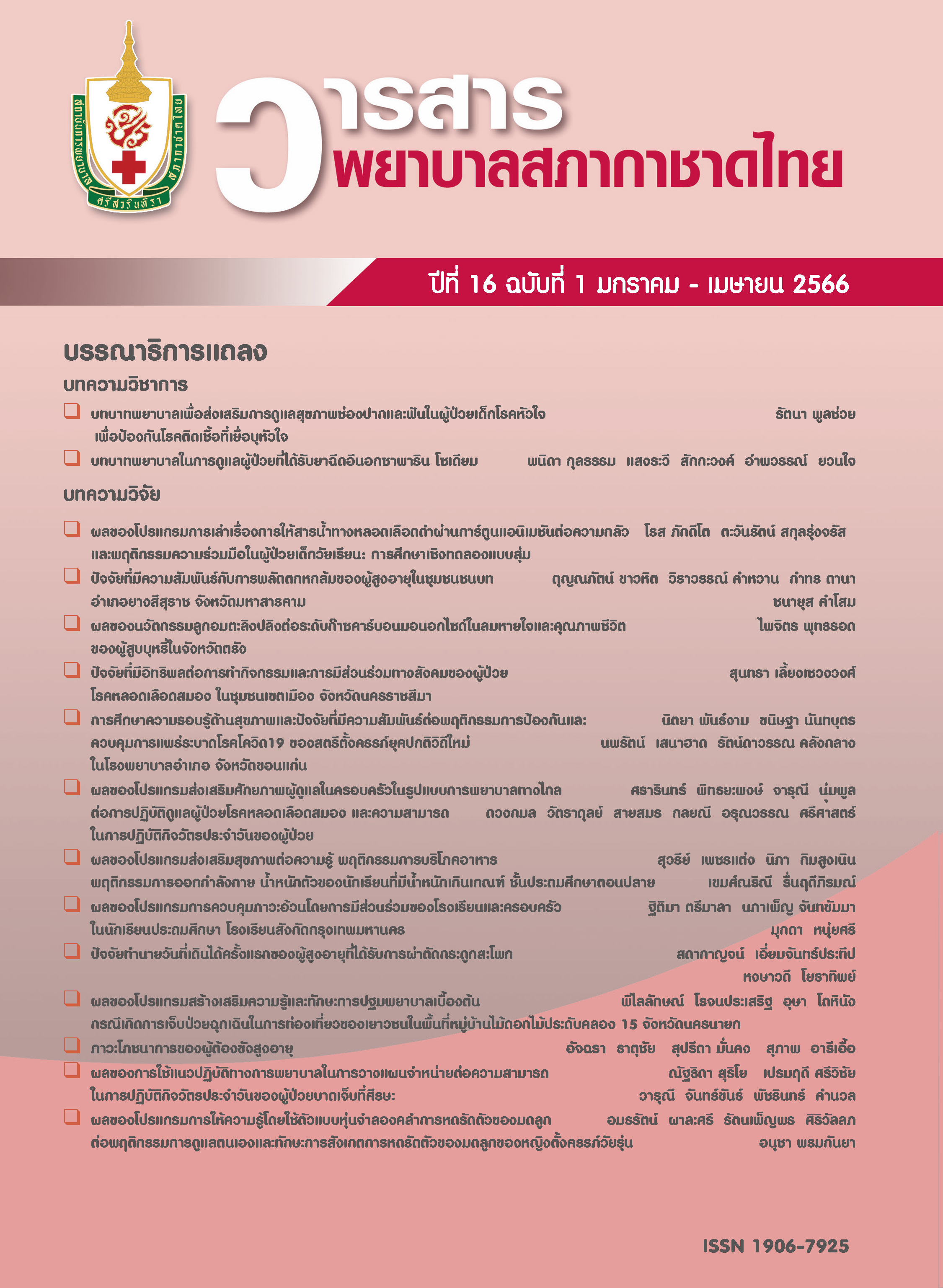Effects of Health Promotion Program on Knowledge, Eating Behavior, Exercise Behavior and Body Weight of Overweight Students in Primary School
Keywords:
health belief model, eating behavior, exercising behavior, body weight of over weight primary studentsAbstract
This quasi-experimental research aimed to study the effects of health promotion by using a health belief model applied to a conceptual model. The experimental group consisted of 20 overweight students at levels 4 - 6 of Nawong Primary School, and the control group consisted of 20 overweight students of Sulakana Primary School, Lak-hok Sub-district, Muang District, Pathumthani Province. The experimental group received a health promotional program comprised of knowledge, demonstrations, role models and meetings within a 12 week period. The control group received the normal program provided by the school in the health education subject and health promoting hospital. Data was collected by pre and post obesity knowledge, eating behavior and exercise behavior questionnaires. The statistics used were descriptive and inferential. Wilcoxon matched-pairs and signed ranks tests were used to compare the groups. Man-Whitney U tests were used to compare another group. The significance level was .05
The results show that after implementation, the experimental group had a mean score of knowledge, eating and exercise behavior which was higher than the control group (p-value < .05). Moreover, the experimental group lost more weight than the control group (p-value < .05). However, the parents played an important role for the students. Thus, the researchers should be aware of these issues. This will help create a more effective health promotion program.
References
Bureau of Nutrition. Guidelines to prevent obesity in primary students. Nonthaburi: Department of Health Ministry of Public Health; 2014. (in Thai)
Aekplakorn W. The survey of Thai population the 5th physical examination health children edition. Nonthaburi: Health Systems Research Institute; 2014. (in Thai)
Office of Evaluation. The report of evaluation for development of health and disease control system: school age group. Nonthaburi: Office of The Permanent Secretary of MOPH; 2016. (in Thai)
Issarasongkhram M, Boonprakong T. Effects of overweight prevention program on preschool caregivers. Journal of the Office of DPC 7 Khon kaen 2018;26(1):35-45. (in Thai)
Yaemmen P, Duangsong R. The effects of health promotion program by application of health belief model and social support on behavioral modification for weight control among overweight students at level 5 of primary school, Muang District, Phitsanulok Province. KKU Res J (GS) 2012;12(1):57-67. (in Thai)
Namyota C, Wongprachum K, Toontom T, Bourneo C. Effects of a nutritional-promoting program on reducing prevalence of overweight and obesity in school-age children. J Sci Tecnol MSU 2022;41(1):49-50. (in Thai)
Nudla P, Jittanon P, Balthip K. Impact of an internet-mediated over-consumption self-reminding programme on the body weight and consumption behavior of overnutrition adolescents. Thai Journal of Nursing Council 2017;32(1):32-46. (in Thai)
Kanawapee S, Saranrittichai K. Effects of health literacy development program and health literate school on behavior modification for obesity prevention among overweight students. Academic Journal of Community Public Health 2022;8(3):105-18. (in Thai)
Buapian T. Model of health promotion activity for body weight controlling among. Inthaninthaksin Journal 2018;13(1):175-88. (in Thai)
Srisatidnarakul B. Effect size, power analysis, optimal sample size calculations, using G*power software. Bangkok: Chulalongkorn University Press; 2020. (in Thai)
Chaichana T, Loyha K, Wongprasert C. The effects of health promotion program through the application of health belief model and social support for weight control among overweight students in grade 4-6. Journal of MCU Ubon Review 2020;5(3): 303-14. (in Thai)
Downloads
Published
Issue
Section
License
Copyright (c) 2023 Srisavarindhira Thai Red Cross Institute of Nursing

This work is licensed under a Creative Commons Attribution-NonCommercial-NoDerivatives 4.0 International License.
เนื้อหาบทความหรือข้อคิดเห็นต่างๆ ในวารสารพยาบาลสภากาชาดไทยนี้ เป็นความคิดเห็นของผู้เขียนบทความ ไม่ใช่ความเห็นของกองบรรณาธิการ หรือสถาบันการพยาบาลศรีสวรินทิรา สภากาชาดไทย






